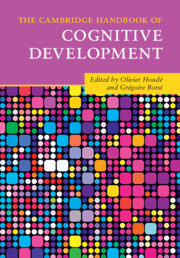Book contents
- The Cambridge Handbook of Cognitive Development
- The Cambridge Handbook of Cognitive Development
- Copyright page
- Contents
- Figures
- Tables
- Contributors
- Introduction
- Part I Neurobiological Constraints and Laws of Cognitive Development
- 1 How Life Regulation and Feelings Motivate the Cultural Mind
- 2 Epigenesis, Synapse Selection, Cultural Imprints, and Human Brain Development
- 3 Mapping the Human Brain from the Prenatal Period to Infancy Using 3D Magnetic Resonance Imaging
- 4 Development and Maturation of the Human Brain, from Infancy to Adolescence
- 5 Genetic and Experiential Factors in Brain Development
- 6 The Brain Basis Underlying the Transition from Adolescence to Adulthood
- Part II Fundamentals of Cognitive Development from Infancy to Adolescence and Young Adulthood
- Part III Education and School-Learning Domains
- Index
- Plate Section (PDF Only)
- References
2 - Epigenesis, Synapse Selection, Cultural Imprints, and Human Brain Development
From Molecules to Cognition
from Part I - Neurobiological Constraints and Laws of Cognitive Development
Published online by Cambridge University Press: 24 February 2022
- The Cambridge Handbook of Cognitive Development
- The Cambridge Handbook of Cognitive Development
- Copyright page
- Contents
- Figures
- Tables
- Contributors
- Introduction
- Part I Neurobiological Constraints and Laws of Cognitive Development
- 1 How Life Regulation and Feelings Motivate the Cultural Mind
- 2 Epigenesis, Synapse Selection, Cultural Imprints, and Human Brain Development
- 3 Mapping the Human Brain from the Prenatal Period to Infancy Using 3D Magnetic Resonance Imaging
- 4 Development and Maturation of the Human Brain, from Infancy to Adolescence
- 5 Genetic and Experiential Factors in Brain Development
- 6 The Brain Basis Underlying the Transition from Adolescence to Adulthood
- Part II Fundamentals of Cognitive Development from Infancy to Adolescence and Young Adulthood
- Part III Education and School-Learning Domains
- Index
- Plate Section (PDF Only)
- References
Summary
The human brain is neither John Locke’s “blank slate” deprived of any pre-existing innate structure – or, in a modern AI language, a random network of undifferentiated neurons fully instructed by experience – nor a fully genetically determined, irrevocably hard-wired neuronal architecture. Neither is it represented by the simplistic yet very popular deep-learning artificial networks. The 85–100 billion neurons of the human brain and their synaptic connections, that arose over million years of evolution and for each individual brain over almost 15 years of postnatal development, possess an original organization unmatched by any of our current computers. It is a unique compromise between an eminently variable, intrinsically rich connectivity and a set of species-specific, genetically determined, rules, which unambiguously make our brain that of Homo sapiens.
Information
- Type
- Chapter
- Information
- The Cambridge Handbook of Cognitive Development , pp. 27 - 49Publisher: Cambridge University PressPrint publication year: 2022
References
Accessibility standard: Unknown
Why this information is here
This section outlines the accessibility features of this content - including support for screen readers, full keyboard navigation and high-contrast display options. This may not be relevant for you.Accessibility Information
- 6
- Cited by
